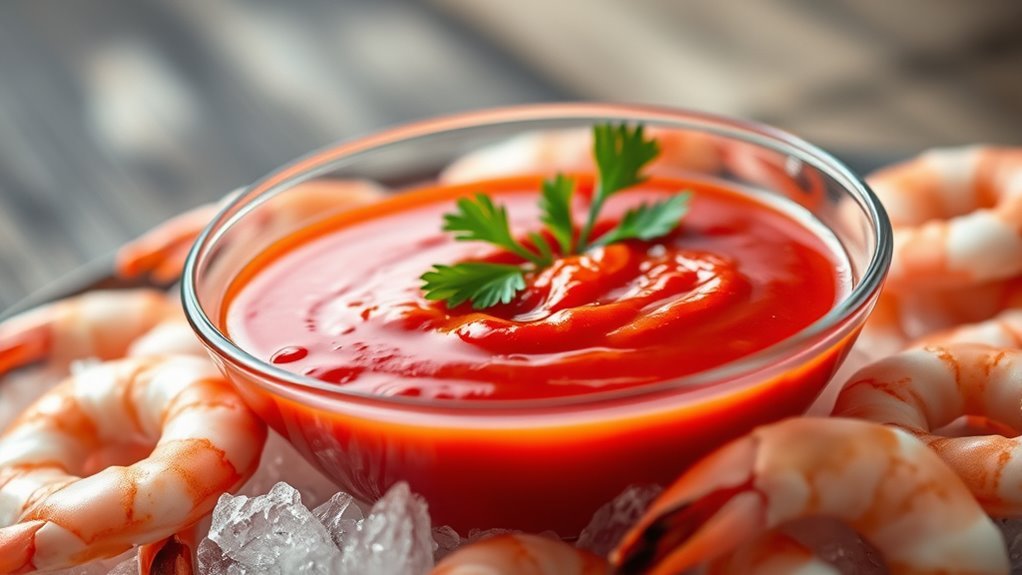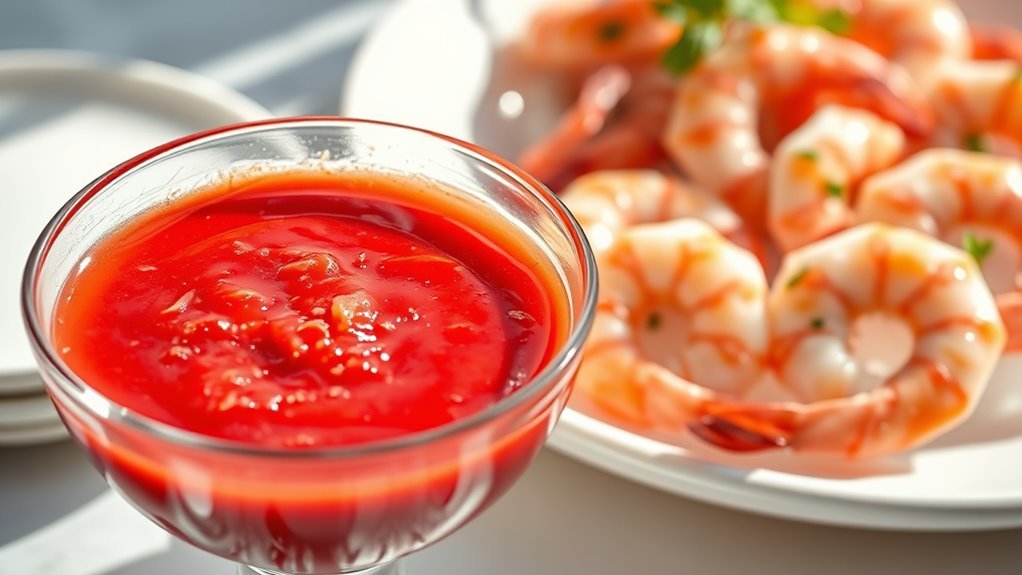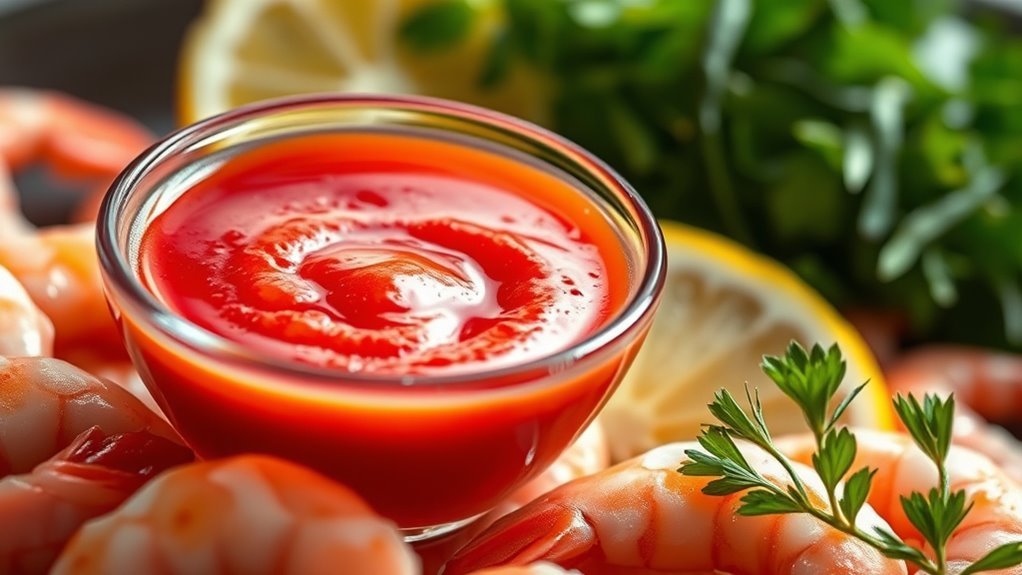Cocktail sauce isn’t typically keto-friendly because it often contains ketchup and added sugars, leading to higher carbohydrate content. A standard serving can have up to 7 grams of carbs per tablespoon. However, you can make your own version using sugar-free ketchup, horseradish, and vinegar, which can fit into a keto diet. Plus, there are store-bought low-carb options available. If you’re curious about how to make a delicious, keto-friendly version, keep exploring!
Understanding the Ingredients in Cocktail Sauce

When diving into the world of cocktail sauce, it’s essential to understand its key ingredients. Typically, the primary ingredient is ketchup, which serves as the base and contributes sweetness. You’ll often find horseradish for that sharp kick, adding depth to the flavor profiles. Ingredient sources may also include Worcestershire sauce, lemon juice, and various spices, each enhancing the overall taste and complexity. Understanding these components can help you appreciate the balance between sweetness and zest. While most recipes stick to these staples, variations exist, allowing for personal flair. Exploring different ingredient sources can lead to unique flavor profiles, making your cocktail sauce experience even more enjoyable. Knowing what goes into it empowers you to create sauces that align with your preferences.
Nutritional Breakdown of Cocktail Sauce

When considering cocktail sauce, it’s crucial to look at the key ingredients and their nutritional impact. You’ll find that the primary components, like ketchup and horseradish, can greatly influence the sauce’s overall carb content. Understanding these factors will help you determine if it fits into your keto diet.
Key Ingredients Analysis
Cocktail sauce, often enjoyed as a zesty dip for shrimp and seafood, typically contains a few key ingredients that can impact its nutritional profile. The primary components are ketchup, horseradish, lemon juice, and Worcestershire sauce. Ketchup provides sweetness and a rich base, while horseradish adds that signature kick, enhancing the flavor profile. Lemon juice offers acidity, balancing the sweetness and amplifying freshness. Worcestershire sauce contributes umami, rounding out the overall taste. While these ingredients create a delightful blend, their individual nutritional values can vary. Understanding these key ingredients helps you make informed choices about incorporating cocktail sauce into your diet, especially if you’re maneuvering a keto lifestyle. Balancing flavor and nutrition is essential for your culinary freedom.
Carb Content Evaluation
Although it’s a popular condiment, evaluating the carb content of cocktail sauce is essential for those following a keto diet. Typically, cocktail sauce contains sugar and tomato paste, which are significant carb sources. Understanding the nutritional breakdown based on serving sizes can help you make informed choices.
Here’s a quick visual representation:
| Ingredient | Carbs per Serving (1 tbsp) |
|---|---|
| Tomato Paste | 2.5g |
| Sugar | 4g |
| Worcestershire | 0.3g |
| Horseradish | 0.2g |
| Total | 7g |
In moderation, you can enjoy cocktail sauce, but be mindful of its carb content to stay within your keto goals.
Carbohydrate Content and Keto Considerations

When considering cocktail sauce on a keto diet, you’ll want to focus on its carbohydrate content, which can vary considerably between brands. Many traditional recipes contain added sugars, but there are also sugar alternatives that could make a keto-friendly version more accessible. Understanding these differences can help you make informed choices while enjoying your favorite seafood.
Carbohydrate Content Analysis
Understanding the carbohydrate content in cocktail sauce is essential for anyone following a keto diet. Typically, cocktail sauces contain sugar or high-fructose corn syrup, which are significant carb sources that can derail your keto goals. Standard variations might have around 4-7 grams of carbs per tablespoon, depending on the ingredients used. If you’re looking for a keto-friendly option, consider making your own sauce using low-carb ingredients, like horseradish and sugar-free ketchup. This way, you can control the carb count while still enjoying that zesty kick. Keep in mind, some store-bought sauces also offer low-carb alternatives, so always check labels to find the best option that aligns with your dietary freedom while minimizing your carb intake.
Sugar Alternatives Comparison
What are the best sugar alternatives for a keto diet? When you’re looking for sugar substitutes that won’t kick you out of ketosis, consider options like erythritol, monk fruit, and stevia. Erythritol has about 0.24 grams of carbs per teaspoon, making it a popular choice, as it’s low-calorie and doesn’t affect blood sugar. Monk fruit, another great sweetener option, is carb-free and has zero glycemic impact, making it perfect for your keto lifestyle. Stevia is also a viable choice, containing negligible carbs. While these alternatives can satisfy your sweet tooth, it’s important to monitor how they affect you individually, as some people may experience digestive issues with certain sugar substitutes. Choose wisely to enjoy your keto journey!
Homemade Cocktail Sauce: A Keto-Friendly Alternative
Although many store-bought cocktail sauces are loaded with sugar and other non-keto-friendly ingredients, making your own version at home allows you to enjoy this classic condiment without compromising your diet. You can control the ingredients and customize the flavors to suit your preferences. Here’s a simple recipe to get you started, along with some homemade variations and flavor enhancements:
| Ingredient | Amount | Flavor Enhancement |
|---|---|---|
| Sugar-free ketchup | 1 cup | Add a dash of hot sauce |
| Horseradish | 2 tbsp | Mix in lemon juice |
| Worcestershire sauce | 1 tbsp | Incorporate garlic powder |
| Lemon juice | 1 tbsp | Experiment with spices |
| Salt | To taste | Use fresh herbs for zest |
Feel free to adjust the ingredients to make it truly yours!
Pairing Cocktail Sauce With Keto Foods
Homemade cocktail sauce not only enhances your seafood dishes but also pairs wonderfully with various keto-friendly foods. For those on a keto diet, seafood pairings like shrimp, crab, or fish are perfect options to enjoy with cocktail sauce. The tangy flavor complements the natural sweetness of seafood, making each bite satisfying.
You can also use cocktail sauce as a dip for veggie dippers, such as celery sticks, cucumber slices, or bell pepper strips. These low-carb vegetables add a crunchy texture and absorb the sauce’s bold flavors beautifully. By combining cocktail sauce with these keto-friendly options, you’ll elevate your meals while staying within your dietary goals. Enjoy the versatility of cocktail sauce and explore new ways to indulge in delicious keto-friendly pairings!
Tips for Enjoying Cocktail Sauce on a Keto Diet
When you’re steering through a keto diet, enjoying cocktail sauce can be both flavorful and compliant with your low-carb lifestyle. Start by choosing a low-carb cocktail sauce option or making your own using sugar-free ketchup and horseradish. This way, you can control the carb count while still enjoying that tangy flavor. Pair your sauce with keto snacks like shrimp, cucumber slices, or celery sticks for a satisfying crunch. Remember, moderation is key; even low-carb dips can add up if you overindulge. Always check labels for hidden sugars, and don’t hesitate to experiment with spices to enhance the flavor without adding carbs. With these tips, you can savor cocktail sauce while staying true to your keto goals.
Frequently Asked Questions
Can I Use Store-Bought Cocktail Sauce on Keto?
You might want to think twice about using store-bought cocktail sauce on keto. Many brands contain added sugars and high-carb ingredients, which could derail your progress. Explore the nutritional information and conduct an ingredient analysis to spot any hidden carbs. While you crave that tangy flavor, consider making your own with low-carb ingredients, ensuring you stay on track without sacrificing taste. Freedom in your diet means being informed!
What Are Keto-Friendly Substitutes for Horseradish in Cocktail Sauce?
If you’re looking for keto-friendly substitutes for horseradish in cocktail sauce, consider using homemade alternatives like wasabi or mustard. Both can add that spicy kick you’re after without the carbs. Additionally, flavor enhancers like garlic powder or lemon juice can elevate the taste while keeping it keto-compliant. Experimenting with these options gives you the freedom to customize your cocktail sauce to your liking, ensuring it fits your dietary preferences perfectly.
How Long Can Homemade Cocktail Sauce Be Stored?
Homemade cocktail sauce can typically be stored in the refrigerator for up to two weeks. For ideal freshness, keep it in an airtight container. If you want to extend its shelf life, you can freeze it for up to three months, though the texture may change upon thawing. Always check for any off smells or discoloration before using. Following these storage tips helps guarantee you enjoy your sauce safely and deliciously!
Is Cocktail Sauce Safe for Dairy-Free Diets?
Yes, cocktail sauce is generally safe for dairy-free diets. In fact, about 7.5 million Americans follow a dairy-free lifestyle. Most traditional cocktail sauce recipes use ingredients like ketchup, horseradish, and lemon juice, which are dairy-free. However, always check the labels for any hidden dairy in pre-made sauces. If you’re using dairy alternatives, guarantee they’re free from cross-contamination. Staying informed about ingredient safety allows you to enjoy your meal freely and confidently.
Does Cocktail Sauce Contain Gluten?
Cocktail sauce typically doesn’t contain gluten, as its primary ingredients—tomato sauce, horseradish, Worcestershire sauce, and seasoning—are usually gluten-free. However, it’s essential to read labels carefully, as some brands may include gluten-containing additives. If you’re looking for gluten-free alternatives, many recipes allow you to make your own at home, ensuring all ingredients meet your dietary needs. Always double-check if you’re unsure, as brands can vary in their formulations.
Frequently Asked Questions about Keto-Friendly Cocktail Sauce
1. Is cocktail sauce keto-friendly?
Traditional cocktail sauce is typically made from ketchup, horseradish, lemon juice, and various seasonings. While the horseradish itself is low in carbs, the ketchup is often high in sugar, making traditional cocktail sauce not keto-friendly. However, you can make a keto-friendly version by using low-sugar or sugar-free ketchup alternatives or by creating a sauce with horseradish and other low-carb ingredients.
2. What are the main ingredients in traditional cocktail sauce?
Traditional cocktail sauce usually consists of ketchup, prepared horseradish, lemon juice, Worcestershire sauce, and spices such as salt and pepper. The main ingredient, ketchup, is where most of the carbohydrates and sugars come from, making it less ideal for a keto diet.
3. How can I make a keto-friendly cocktail sauce at home?
To make a keto-friendly cocktail sauce, start by combining prepared horseradish with a low-carb ketchup substitute or simply mix horseradish with lemon juice and spices. You can also add a dash of hot sauce or a pinch of garlic powder for extra flavor. Be sure to check the labels of any products you use to ensure they are low in sugar and carbs.
4. What are some low-carb alternatives to traditional cocktail sauce?
Some low-carb alternatives to traditional cocktail sauce include using homemade sauces made from horseradish mixed with olive oil, lemon juice, and spices. Additionally, you can use sugar-free ketchup or hot sauce blended with horseradish for a spicy kick. Avocado or guacamole can also serve as a delicious dip for seafood, providing healthy fats without the carbs.
5. Can I enjoy seafood with cocktail sauce while on a keto diet?
Yes, you can enjoy seafood with a cocktail sauce while on a keto diet, provided you use a keto-friendly version of the sauce. Seafood is generally low in carbs and high in protein, making it an excellent choice for a keto diet. Just ensure that you pair it with a low-carb dipping sauce to stay within your carbohydrate limits.
References
- https://www.healthline.com/nutrition/keto-diet-food-list
- https://www.medicalnewstoday.com/articles/323583
- https://www.livestrong.com/article/520356-cocktail-sauce-ingredients-nutrition-facts/
- https://www.createdby-diane.com/2020/05/keto-cocktail-sauce.html
- https://www.ncbi.nlm.nih.gov/pmc/articles/PMC6520987/
- https://www.washingtonpost.com/food/2021/08/09/keto-diet-tips/
- https://www.cdc.gov/healthyweight/healthy_eating/index.html


